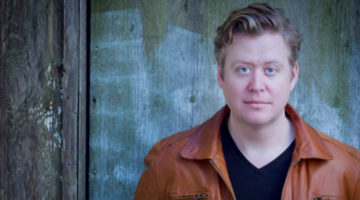5 Questions with Guy Maddin and Evan Johnson of The Forbidden Room
Speaking with Guy Maddin and Evan Johnson is an extremely wonderful experience. We actually first encountered them the night before our interview, exiting the theatre, in the TIFF Bell Lightbox, naturally, where their film The Forbidden Room was receiving its Canadian première. The film has to be experienced to be believed, but we could have spoken even longer than the thirty minutes granted to us. We talked with Johnson Maddin at the Intercontinental Hotel towards the conclusion of TIFF.
Scene Creek: Where are you coming from?
Guy Maddin: I have a job for the year, because this movie emptied out my bank account, my couch, (laughing), my change dish, my pockets, everything.
So I got a teaching job for the year, luckily enough, at Harvard. So I came from Boston yesterday, straight, on Porter, and straight to the theatre to introduce the movie. It’s fun, it’s quick, yeah. Evan is coming from Winnipeg and going back in a few minutes.
Evan Johnson: I’m not at Harvard. I don’t have a job lined up, at Harvard.
Guy Maddin: He’s the father of a young boy. I’m more rejuvenated now, having met with and worked with Evan. I’m re-enthused, reinvigorated about making movies now.
Scene Creek: Your film debuted at Sundance?
Guy Maddin: Yes, The Forbidden Room debuted at Sundance, in a slightly longer fifteen minute version and with a flawed DCP in which the left and the right audio channels were out of sync by fifteen seconds and not one person noticed but it was a nightmare to us, because we really worked hard on the sound design, and we wanted it to sound a certain way, and we didn’t want random lines of dialogue to be repeated fifteen seconds apart from each.
Scene Creek: That’s incredible. Not one person noticed?
Guy Maddin: As a matter of fact, Richard Lorber, our American distributor, said he loved the soundtrack. (Laughing) And bought the film on the spot. No, it’s a kind of flexible movie that way, but it was agony for us, because we worked really hard on narrative clarity of each unit, because there’s up to nine strata deep of narrative at one point or another in all these interrelated but seemingly unrelated stories. And we wanted each one to be clear, but it gets weird when a line of dialogue from one story is repeated fifteen seconds later, full into another story. So that was a disaster for me, for Evan too I know and it just didn’t go away.
But anyways, that’s all in the past, and we watched last night here at TIFF to make sure the DCP was in good shape and then left feeling in pretty good shape. The sound and the projection here (at the TIFF Bell Lightbox) is excellent. That is the way that it was meant to be seen.
Scene Creek: Which fifteen minutes are gone?
Evan Johnson: Well, you wouldn’t notice.
Guy Maddin: Just screw-tightening.
Evan Johnson: We didn’t take out a line of dialogue. We just took out two frames.
Guy Maddin: We just finished the movie. Actually, at one point, we were too lazy to edit it, we just ran it through the computer speeding it up by ten percent.
Evan Johnson: Yeah, one hundred and ten percent. It cut off nine minutes or something like that. And you barely notice. I think some people’s voices are a little bit higher.
Guy Maddin: But then we basically just did that, which was to remove ten percent of the running time through screw-tightening. Not one story was lost. Basically just picture, lock, edit and it was fine and I like it better now. It’s a bad sign when the director is starting to flag watching his own film. I feel much better about it now.
Scene Creek: Did you have any difficulty bringing your cast on board?
Guy Maddin: For some reason, there were no scheduling problems, and that often determines the role they played, you know? If we were shooting the movie that day, Karine Vanasse, for example, she was only available on the first day of shooting, and she was the first one up for some reason.
Evan Johnson: She was doing TV or something.
Guy Maddin: Almost everybody got on board, but that is because our casting agent in Paris, this guy named Alexandre Nazarian. I was prepared to cast the movie using Facebook acquaintances, so-called Facebook friends in Paris. But this guy knew the Parisian acting community so well. He knew which ones would be up for an adventure, of acting in public and which ones act for money. So we only asked the ones that would be up for an adventure. They all accepted with the exception of Frederick Wiseman, who turned us down and Michel Piccoli, who said that he had to leave. He had to wash his hair. (Evan and Guy both laugh). But every time that I met someone for coffee or for lunch, there were no auditions, believe me. You know, there was maybe an hour of sipping coffee and getting to know them a little bit and explaining the project to them, and they always agreed. They showed up and got in the spirit of things.
Evan Johnson: We didn’t have a role for Frederick Wiseman in mind, we just wanted him. We found the name Frederick Wiseman and our list of possible actors and thought “yes!” I don’t know how or why he ended up there, if it was a mistake.
Guy Maddin: Nope. Nope. He was in Paris at the time. He’s been there, and I’ve seen him on the sidewalk a few times. What a face, holy smokes! We just followed him for a few blocks. That’s what was disappointing, that a non-actor turned us down. (Evan and Guy both laugh). I’ll get him yet! If it takes twenty or thirty years!
The Forbidden Room is now playing at the TIFF Bell Lightbox.



